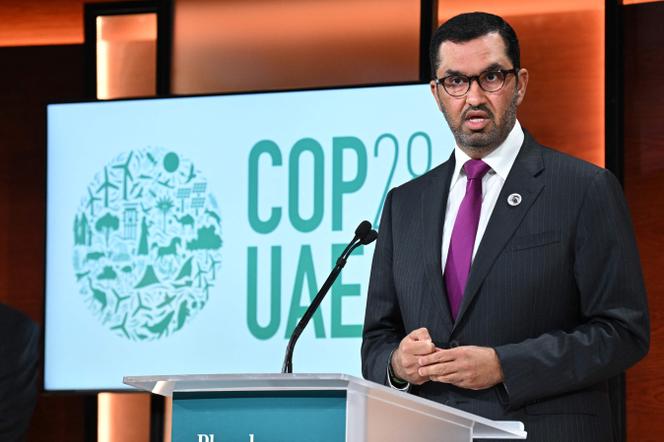


With three days to go before the opening of the 28th Conference of the Parties (COP28) in Dubai, United Arab Emirates (UAE), one piece of news came at the worst possible time for its organizers. On Monday, November 27, the BBC, working with journalists from the Centre for Climate Reporting, found that the Emirati president of the summit, Sultan Al-Jaber – who is also the head of the country's main oil company, Abu Dhabi National Oil Company (ADNOC) – had used his position to try to secure new energy trade deals.
The source of these revelations is a collection of 150 pages of briefings, prepared by his team before meetings with foreign delegations and ministers between July and October. Both Masdar, another of Al-Jaber's companies specializing in renewables, and ADNOC are mentioned; and the document preceding a meeting with the Chinese delegation states that the oil company wished to "jointly evaluate international LNG [liquefied natural gas] opportunities" in Mozambique, Canada and Australia. It remains to be seen to what extent the COP28 president addressed these subjects during those talks. "The documents referred to in the BBC article are inaccurate and were not used by COP28 in meetings," said a COP28 presidency spokesperson.
The article has further confused the UAE's position, as it seeks to clean up its image. On November 11, 2021, the Emirati president congratulated himself on Twitter: His country had just been chosen to host the major annual climate summit's 2023 edition. "We look forward to working with the international community to accelerate global efforts to address climate change & environmental protection & create a more sustainable economic future," wrote Mohammed bin Zayed. Climate or economy? This carefully worded message contains all the buzzwords, does not make a clear-cut decision, summing up the COP28 host country's ambiguous position.
The choice of the Emirates, an oil-rich monarchy with little regard for human rights, was seen as a provocation by non-governmental organizations. In January 2023, when ADNOC president Al-Jaber was appointed president of the COP, civil society became even more disillusioned. Since then, NGOs have been raising questions: What does the world's seventh-largest oil producer really want? To sincerely work towards a more sustainable future, or to slow down the climate cause?
Hurt by the criticism, according to several sources, Al-Jaber – who has represented his country at the COPs for many years – spared no time in trying to reassure his counterparts. He has made trips to many capitals, had meetings with pro-climate activists – including in France, in March – and sent "letters to the parties" in which he mentions all the issues, from financing to adaptation and mitigation. "He does the job of talking to everyone and he's easy to talk to. The United Arab Emirates know that they have a vested interest in the outcome of this conference," said Agnès Pannier-Runacher, French Energy Transition Minister.
You have 65% of this article left to read. The rest is for subscribers only.
